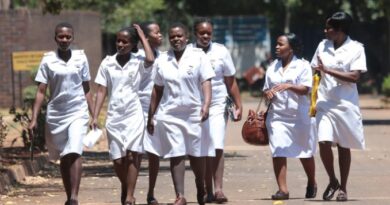Care worker recruitment from abroad to end, UK Home Office Minister says
International recruitment for care workers will end under plans announced by UK Home Secretary Yvette Cooper.
The government’s Immigration White Paper, published in Parliament on Monday, will include the change as the government takes action to bring down historically high levels of net migration.
Care workers from overseas have made a huge contribution to social care in the UK, but too many have been subject to shameful levels of abuse and exploitation.
Workers seeking to support the UK’s care sector arrived to find themselves saddled with debt, treated unfairly, or in extreme cases discover the jobs they were promised did not exist.
In March, the Home Office revealed over 470 care providers had had their licence to sponsor international staff suspended since 2022.
Under plans to be outlined on Monday (12 May), the government will go further and put an end to any more overseas recruitment.
The crackdown on rogue care providers has seen around 40,000 workers displaced, many of whom are ready to rejoin the workforce. They will be given the opportunity to do the jobs they were promised, while long-term plans are drawn up to train homegrown talent into the care sector.
International workers who are already sponsored to work legally in the sector will be able to continue to extend their stay, change sponsors and apply to settle, including those who need to switch employers following a sponsor licence revocation.
“This government is committed to tackling these issues and has committed to establishing Fair Pay Agreements which will empower worker, employer and other sector representatives to negotiate improvements in the terms of employment.
“This builds on the announcement in January of the expansion of the Care Workforce Pathway which will support the adult social care sector to professionalise the workforce.
“Together, these measures will move the UK away from a dependence on overseas workers to fulfil our care needs.
“Baroness Casey has also begun work on an independent commission into adult social care – a once in a generation opportunity to transcend party politics and build consensus on the future of the sector.
“The Immigration White Paper, published in full tomorrow, is part of government efforts to restore order, control and fairness to the system, bring down net migration and promote economic growth,” a government statement read.
Shadow home secretary Chris Philp said the plans were “too little” and called for an annual cap on migration.
Successive governments have tried unsuccessfully to reduce net migration, which is the number of people coming to the UK minus the number leaving.
Net migration climbed to a record 906,000 in June 2023, and last year it stood at 728,000.
The Home Office has not yet officially confirmed what will be in its immigration White Paper, due early next week.
Speaking on the BBC’s Sunday with Laura Kuenssberg, Cooper said the government “was setting up plans for a substantial reduction in net migration” but added targets would not be set, saying “they undermined the credibility of anything that governments do”.
The threshold for skilled visas is expected to be increased to graduate level, tightened from the current A-level measure.
There will also be a “narrower” list of exceptions to the rules for temporary shortage visas in some industries, Cooper said, but did not give examples.
Currently, roles considered to be in short supply in the UK like carpenters, graphic designers and pharmaceutical technicians can be placed on the Immigration Salary List (ISL),, external allowing employers to hire overseas workers at discount – set at 80% of the market rate.
Cooper said the government expects those changes will “lead to a reduction of up to 50,000 fewer lower skilled visas over the course of the next year”.




